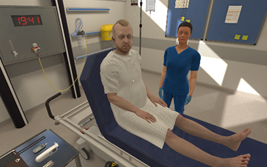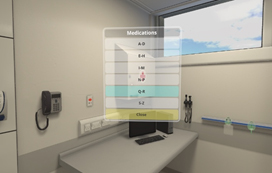Mike O’Driscoll, Professor Michael Traynor
Report published: July 2021.
Introduction
In April 2020 the adult child midwifery (ACM) department at Middlesex University started using online screen-based simulation (OSBS) software sourced from Oxford Medical Simulation[1] (OMS). OMS was originally designed to be used with virtual reality hardware and delivered in the classroom setting. However, due to COVID-19 restrictions the delivery of the programme was remote and online only i.e. students participated in these simulations on their own computers, and mostly at home.
This simulation platform places students into a virtual ward or single bedded area, students are then able to control their environment and interact with the surrounding equipment as in clinical practice. There is a usually a support worker present in the room who the student can interact and communicate with. Each of the simulations features a patient presenting with a specific medical condition with certain scenarios also involving patients presenting with a variety of social or psychological issues. The student is then required to undertake a clinical assessment of that patient, using their clinical knowledge to draw conclusions and make decisions regarding patient care within a safe environment.

Evaluation
The independent evaluation of this OSBS initiative was commissioned by the ACM department in April 2020 and data collection was carried out between June and September 2020. The mixed methods evaluation was led by Mike O’Driscoll and Prof. Michael Traynor, incorporating an online survey and online focus groups with students who had participated in the OSBS initiative as well as an online focus group with staff. Relevant secondary data (such as the number of times students participated in each scenario), which was available via the OMS system, was also analysed.

Learning Objectives
Learning objectives for 3rd Year (adult and children and young people) nursing students who were to go into practice earlier than anticipated (through an opt in ‘extended placement’) because of the increased need for staff as a result of the COVID-19 pandemic: included
- To develop knowledge and understanding of the physical assessment of an acutely unwell patient and reflect on their practice.
- To develop the technical and non-technical skills required when assessing and intervening with the acutely unwell patient and reflect on their practice.
- To upskill current third year adult and children and young people nursing students to prepare them for being deployed as a result of the COVID-19 pandemic.
The OSBS initiative was also aimed at adult and children and young people third year nursing students who did not opt for the ‘extended placement’ and with adult and children and young people second year students; mental health nursing students (2nd and 3rd year); nursing associates (2nd year); third year midwifery students and PG Dip 2nd year students. For these groups there were slightly different learning objectives:
- Enable healthcare students to develop knowledge and understanding of the physical assessment of the acutely unwell patient.
- Enable healthcare students to develop technical and non-technical skills required when assessing and intervening with the acutely unwell patient.
Evaluation Findings
The response rate to the online survey was 25% (617 students invited, 154 wholly or partially completed questionnaires obtained). 13 students took part across two online focus groups. Seven members of staff took part in an online focus group and one took part in a one to one interview (as they had been unable to attend the focus group).
There is strong evidence of the OSBS learning objectives having been met, particularly from survey evidence regarding which skills students perceived they had gained which could be transferred into practice and learning outcomes or objectives they felt they had achieved, and this is supported by focus group evidence. A very large majority of respondents felt that they had gained skills in making clinical decisions based on their observations and prior knowledge; escalating issues to senior members of staff and using time effectively across different activities.
Respondents were very positive (mean ratings above four on a scale of 1 to 5 about the last scenario participated in, on a range of measures including realism, usefulness and overall satisfaction. Most respondents did not consider there were serious barriers to their participation in OSBS and there were no statistically significant differences in perceived barriers to participation by scenario, age, learning style, programme or year of programme and few differences on gender. However, a considerable limitation of the evaluation is that those who took part in the evaluation had participated in the OSBS (i.e. those who experienced barriers (or did not like OSBS for whatever reason) were under-represented in the evaluation).
Download full report
If you have any queries about this research or would like to discuss a research project please contact Mike O’Driscoll (m.odriscoll@mdx.ac.uk) or Professor Michael Traynor (m.traynor@mdx.ac.uk).




